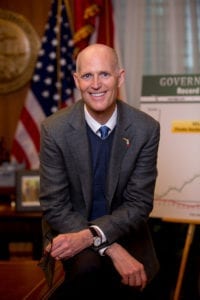
The last day of the regular Florida State House session, representatives overwhelmingly approved SB 436, the Florida Student and School Personnel Religious Liberties Act. The vote was 103 to 12, though the Christian Family Coalition (CFC) was alone in its effort to pass the law. CFC not only endorsed the bill, but also submitted testimony, testified, and e-mailed supporters about this bill. Though the Florida Student and School Personnel Religious Liberties Act was derided by groups such as the Anti-Defamation League, the Florida Humanist Society, and the National Organization of Women, the Christian Family Coalition prevailed after hearings in the Senate Judiciary Committee, House Pre-K -12 Quality Subcommittee and the House Education Committee. Governor Rick Scott signed the bill into law in spite of vehement opposition from the ‘gay’ rights lobbyist groups Human Rights Campaign and ‘Equality’ Florida.
The official statement from the Christian Family Coalition Florida celebrated its passage: “We thank the legislative sponsors, State Senator Dennis Baxley and State Representatives Kimberly Daniels and Patricia Williams for filing this bill in spite of strong opposition. Thank you to all our CFC Florida members and supporters who signed this petition and made their voices heard. Our hard work through the legislative session has paid off. Religious liberty is a right in this nation that we need to keep fighting for. We will always be your voice in government against discrimination.”
What the law says
The law is designed to defend students’ and teachers’ rights. The religious liberty of students is established by setting policy permitting expression of faith in any event at which students speak publicly, regardless of what grade level the student is in. The Department of Education in Florida will set policy for voluntary expression of religious by both students and school personnel at all public schools and require each district school board to implement them. School personnel retain the right to participate in religious activities initiated by students, not conflicting with the duties or responsibilities of the personnel and at reasonable times before or after the school day. It also requires the district to use a disclaimer, orally or written down, when a student speaks, reminding the public the student’s speech is not endorsed, sponsored, or either an expression of or the position of the school itself. The plain text of the law seems to answer concerns of those valuing the separation of church and state.
Concerns
Not everyone concerned about the separation of church and state is convinced, however. Richard Stark wrote an editorial piece for the Sun-Sentinel expressing concern. Though he is the co-chair of the legislative fellowship’s prayer group and many of his party’s members supported the law, he has concerns about the law’s broad scope.
“Anytime we change just one word or comma in a Florida statute, it can have enormous consequences. One section of the bill stated, ‘A school district may not discriminate against a student, parent or school personnel on the basis of religious viewpoint or religious expression.’ another states, ‘A school district shall adopt a policy that establishes a limited public forum for student speakers at any event at which a student is to speak publicly.’ This means teachers would have more flexibility in what they say about religion during instructional time, and students could give a religious speech at graduation or at a pep rally.”
His concern is a graduation speech could be used by an atheist to berate religion, or that a Muslim student could give a speech including Muslim prayers, and the other students, parents and faculty would have to listen. He believes the new law will have unintended consequences and will lead to lawsuits by both students and parents.
Allowing religious expression
Anthony Verdugo of the Christian Family Coalition sees the law differently. He sees it leveling the playing field in terms of equal rights, and giving proper legal and reasonable safeguards for students, school personnel and parents when it comes to their religious expression or viewpoint in Florida schools.
In response to concerns expressed by Mr. Stark, he replied: “Religious harassment and bullying is already taking place in our schools by members of other faiths, which is exactly why we need this new law. The entire purpose of this legislation is to prohibit this type of discrimination. During committee meetings we documented over one dozen cases of religious discrimination in our schools… the case of Giovanni Rubeo, who was told by his teacher at Park Lakes Elementary in Lauderdale Lakes that he could not read his Bible, while other students were free to read any book they chose. This is discrimination. In another Florida case, lesbian LGBT promoting math teacher Lora Jane Reidas told her students that they could not wear a cross because the cross, according to the teacher, ‘represents a gang symbol.’”
Verdugo’s view is the law is a safe guard itself, and will prevent the types of problems Stark is concerned about.
Historical insight
The Founding Fathers’ original intent was to preserve the separation of church and state, while preserving the freedoms of religion, faith and speech. The Danbury Baptists once expressed similar concerns about the ‘separation of church and state’ to Thomas Jefferson. He responded: ” Believing with you that religion is a matter which lies solely between man and his God; that he owes account to none other for his faith or his worship; that the legislative powers of government reach actions only and not opinions, I contemplate with sovereign reverence that act of the whole American people which declared that their legislature should “make no law respecting an establishment of religion or prohibiting the free exercise thereof,” thus building a wall of separation between Church and State.” (https://wallbuilders.com/separation-church-state/)
Separation of church and state cannot deny God-given rights, but prevents the removal of them by a state church or a godless state.
Penni Bulten is a homeschooling mom who is fascinated with the Founding Fathers and their faith. She can be reached at [email protected].

Comments